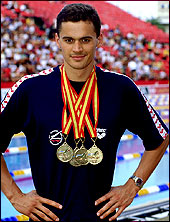 Alexander
Popov Alexander
Popov
Alexander Popov is a four-time Olympic gold medallist. Alexander
"Sasha" Popov was born on November 16, 1971 in Sverdlovsk
(now called Yekaterinburg), Russia.
Popov did not start swimming until he was 8, because
of his fear of water. "I was
afraid of the water," explains Alex. "My
father sent me to the pool and I have been stuck there ever
since."
He began attending overseas swim camps at age 11 and
by age 14, he was Russian junior champion.
He spends over 6 hours a day in the pool at the Australian
Institute of Sport in Canberra, where he has trained since
his coach moved there in 1993, and swims 80-90km a week, much
more than most sprinters do.
|
|
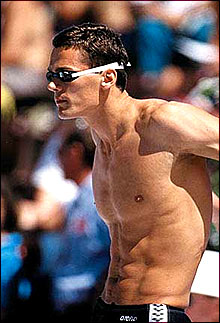 Unknown
to many, Popov started out as a backstroker first, only switching
to freestyle after joining the squad of highly respected coach
Gennadi Touretski in October 1990. Alex hasn't given up backstroke
altogether and occasionally competes in backstroke events
for fun. But it was with his freestyle that propelled Popov
to the number one ranking. Unknown
to many, Popov started out as a backstroker first, only switching
to freestyle after joining the squad of highly respected coach
Gennadi Touretski in October 1990. Alex hasn't given up backstroke
altogether and occasionally competes in backstroke events
for fun. But it was with his freestyle that propelled Popov
to the number one ranking.
Following his tremendous successes at the 1996 Olympics
held in Atlanta, where he snared multiple gold medals, Alexander
returned to his Russian homeland to celebrate and to meet
with various dignataries who were obviously eager to congratulate
him. On his way home from one such reception in Moscow he
was stabbed in the stomach, damaging his kidneys and grazing
his lungs. It turns out that he was attempting to purchase
some fruit from a street vendor, and they got into an argument
over the price of some inferior quality watermelons. The crazed
shopkeeper stabbed Alexander, causing him to be temporarily
hospitalised.
|
|
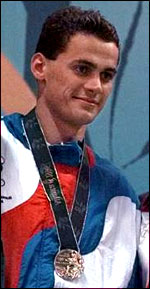 Thin
and drawn after his ordeal, Alex nevertheless kept up with
the star's schedule that awaited him, including meetings with
journalists and city officials, and the lengthy award ceremony
in Volgograd. Thin
and drawn after his ordeal, Alex nevertheless kept up with
the star's schedule that awaited him, including meetings with
journalists and city officials, and the lengthy award ceremony
in Volgograd.
Obviously touched, Alex admitted that the avalanche
of get well wishes that he received while in hospital meant
a lot to him. His doctor explained that Alex was very lucky
that the damage had not been worse: the knife had damaged
his pleural lining, but not his lungs. Surgery had lasted
more than two hours.
Despite the serious nature of the setback, he says
he prefers to put it behind him. He is as determined as ever
to be in Sydney in four years, and says that nothing will
stop him.
|

|
Evgeny
Plushenko
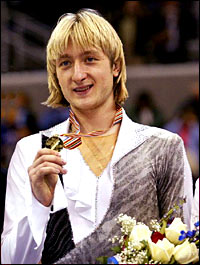 Evgeny
Plushenko was born in 1982 in Khabarovsk, Russia. Evgeny
Plushenko was born in 1982 in Khabarovsk, Russia.
Everything began with a present. One time Evgeny and
his mom went for a walk and they met an aquaintance with her
daughter. The girl cried because she didn't want to skate anymore.
The aquaintance looked at Evgeny and asked him if he wants the
skates. That's how Evgeny started to skate.
Before that incident, Evgeny was ill quite often and
his mother was really worried about her son's health. His parents
signed him up for skating, dance, they taught him how to ski,
they bought him a bicycle and made him train at home with a
ladder, a horizontal bar and a swing. Evgeni excelled at dance
and skating.
His dance coach said: "You
must dance, not skate". His skate coach said:
"You must skate, not dance."
His mother said: "You must choose."
Luckily for all of us, he chose to skate.
|
|
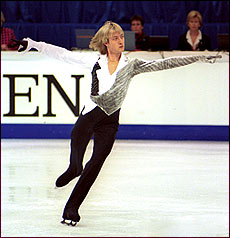 He
started skating when he was four years. Being the youngest
of all in the skating group, was very hard for him. He used
to cry, hit hard the ice, but he kept on going. He trained
every day with his coach Mikhail Makoveyev. He was a good
student, learnd very quickly all sort of elements, like the
Biellmann Spin. Now, the Biellmann Spin is his trademark. He
started skating when he was four years. Being the youngest
of all in the skating group, was very hard for him. He used
to cry, hit hard the ice, but he kept on going. He trained
every day with his coach Mikhail Makoveyev. He was a good
student, learnd very quickly all sort of elements, like the
Biellmann Spin. Now, the Biellmann Spin is his trademark.
Evgeny Plushenko is the only senior male figure skater in
the world who is capable of doing the Biellmann Spin.
When he was 11, Evgeny did all triples, which means
that he was already a figure skater of a very high level.
But at the same age, the local area was closed down due to
financial problems and Evgeni had to quit figure skating.
His mother tried to make him play other sports, like soccer
and karate. For a while he agreed, but quickly pulled out.
Ice and figure skating became a part of him during the 7 years
of hard work. His mother and coach Makoveyev took him to St.
Petersburg to meet the famous coach Alexei Mishin. It was
obvious to Mishin that Evgeny was very talented.
Evgeny and his mother moved together to St. Petersburg.
They lived in an austere apartment and were supported by Mishin.
But soon they found out that they could not afford to live
in St. Petersburg both. His mother went back to Volgograd
and from there, Evgeni had to do everything on his own.
It was hard for him, being just 11 years old and living by
himself. Mishin helped him, fed him and gave him money.
A year later, his mother, who could not bear anymore being
away from her son, went back to St. Petersburg.
|
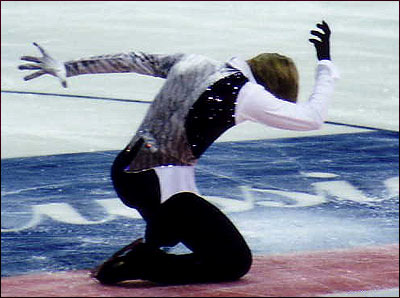
The 1997-1998 season was Evgeni's breakthrough year.
At the Cup of Russia in St. Petersburg he finished second, at
the Russian Nationals in Moscow as third, at the European Championships
in Milan, Italy as second and at the World Championships in
Minneapolis, Minnesota as third. With his succes he earned a
lot of money, although he was just 16 years old. He bought an
apartment where he now lives with his parents. He also supports
his sister, who still lives in Volgograd with her husband and
child.
In 1999, Evgeny amazed the skating world with a quad,
triple, double combination, and beated Yagudin to become Russian
National. From there, the competition between the two former
training mates began. If Evgeny finished first, Yagudin was
second. And if Yagudin finished first, Evgeny was second. In
the season 1999-2000 Evgeni said goodbye to the second place
for almost all competitions. At 9 great competitions, Evgeny
ended 7 times first, one time second, and one time fourth
at the World Campionships in Nice, France. After that season,
Evgeni ended up first at many other competitions for the next
two seasons.
It was hard for him to reach the top. He worked hard
for so many years, had to overcome a lot of problems in his
childhood. But still, we have to believe that it was faith,
him becoming one of the world's best figure skater. Maybe
it was faith too that he had to reach the top by overcoming
so many problems. It taught him how to fight and not to give
up to easily. He skates with his hearth, with so much passion.

|
|
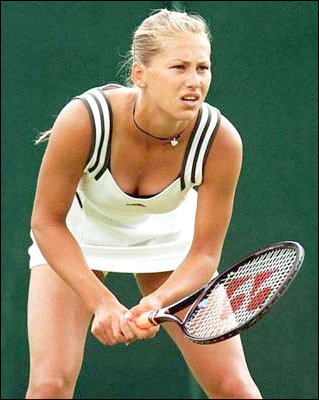
Russian-born tennis player Anna
Kournikova. |

|
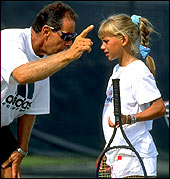 Anna
Kournikova Anna
Kournikova
Anna Kournikova has become the world’s most
celebrated tennis player despite her on-court results, not because
of them. What’s forgotten is that behind the sexy persona
is an athlete of enormous talent.
Anna Kournikova was born June 7th 1981 in Moscow.
Her father, Sergei Kournikov was 20 at the time.
He is a former Greco-Roman wrestling champion, had earned a
Ph.D and was a professor at the University of Physical Culture
and Sport in Moscow. As of 2001, he was still a part-time martial
arts instructor there. Her mother Alla, a sturdily built blonde
who was 18 when Anna was born, had been a 400-meter runner.
Anna received her first tennis racquet at 5 years old
when her parents sold their TV to buy her one for Christmas.
She played in a club near her place until age 11. After which
she moved to Bradenton, Florida (USA) to train with Nick Bollitierri.
Anna’s parents didn’t know what to make of her tennis
obsession, but as athletes, they were sensitive to it.
At 14, she represented Russia in a Fed cup match and became
the youngest player ever to win a fed cup match.
|
|
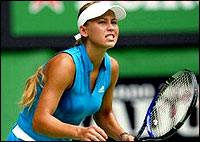 Kournikova,
at age 15, qualified and made it to the fourth round of the
1996 U.S. Open, her first Grand Slam. A year later, she became
only the second woman in the Open era (after Chris Evert)
to reach the semifinals in her Wimbledon debut. In ’98
she beat four Top 10 players in as many days to reach her
first career final, in Miami. Three months later, she beat
Steffi Graf on grass, something only two others accomplished
in the 1990s. Kournikova,
at age 15, qualified and made it to the fourth round of the
1996 U.S. Open, her first Grand Slam. A year later, she became
only the second woman in the Open era (after Chris Evert)
to reach the semifinals in her Wimbledon debut. In ’98
she beat four Top 10 players in as many days to reach her
first career final, in Miami. Three months later, she beat
Steffi Graf on grass, something only two others accomplished
in the 1990s.
|
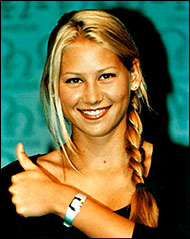 The
most frequent statement one finds in articles about Anna Kournikova
is that she has "never won a singles
title". The
most frequent statement one finds in articles about Anna Kournikova
is that she has "never won a singles
title".
Yet Anna has won 2 adult tournament titles, at Midland,
Michigan, on Feb. 18, 1996, and at Rockford, Illinois, on March
10, 1996 (as well as many 18 and under titles, all before she
was 16). These tournaments were sanctioned by the International
Tennis Federation, but not the Women's Tennis Association.
'I don’t care what anybody said
about why I lost,' Kournikova says.
'I entered the French Open because I love to play and I couldn’t
stand the idea of missing it. This game isn’t part of my
life. This game is my life.'
The fact that Anna Kournikova has achieved widespread fame
without winning a single tournament causes resentment among
many players. Kournikova’s high profile makes her an
especially inviting target for opponents, who feel that they’re
underrated because of all the Anna's publicity.
After beating Kournikova 7-6 (7-6), 6-4 in the Minnesota
Tennis Challenge, Seles scoffed at the suggestion that there's
any animosity toward the 21-year-old Russian, who's known more
for her beauty than her forehand.
"I don't think there's animosity.
My gosh, that's a strong word to use," Seles
said after the exhibition match. "She's
dedicated her life to this sport. She's one of the hardest
workers on tour."
|

|
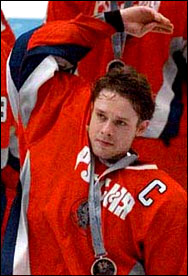 Pavel
Bure Pavel
Bure
As his nickname -- the "Russian Rocket"
-- suggests, when Pavel Bure takes aim in the offensive zone,
the results tend to be devastating.
His speed and dekes leave defenses helpless, while his
goal and point totals cause record books to be rewritten.
Pavel Bure was born in March 31, 1971 in Moscow, Russia.
|
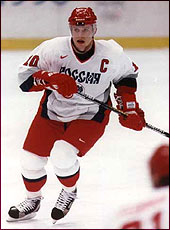 With
the Vancouver Canucks, Bure racked up 60 points to win the Calder
Trophy as the league's top rookie in 1991-92. He treated the
Canucks -- who drafted him with their sixth choice (113th overall)
in the 1989 NHL Entry Draft -- to back-to-back 60-goal seasons
the following two years. With
the Vancouver Canucks, Bure racked up 60 points to win the Calder
Trophy as the league's top rookie in 1991-92. He treated the
Canucks -- who drafted him with their sixth choice (113th overall)
in the 1989 NHL Entry Draft -- to back-to-back 60-goal seasons
the following two years.
He became the first Canuck to win a major post-season
award when he won the Calder Trophy. |

|
Links
About Kournikova: www.tennis.com,
Kournikova posters at www.art.com,
lpictures abd biography of Evgeny
Plushenko, Sergey
Fedorov official site, Pavel
Bure official site, legends
of the Russian Sport (in Russian). |
|



